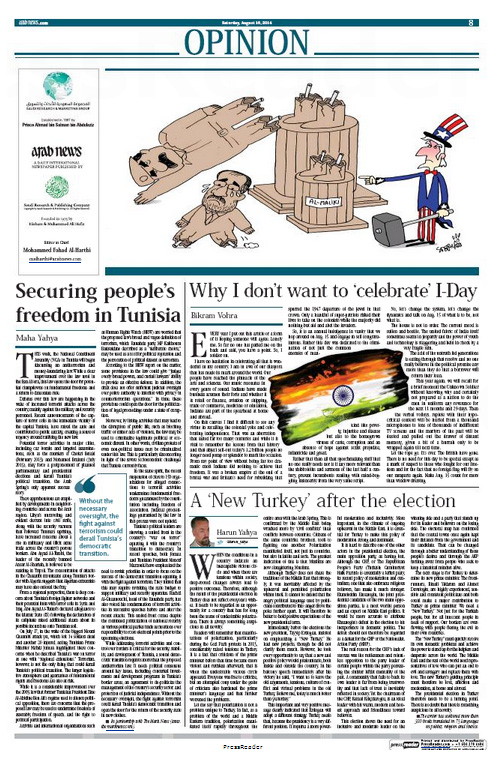
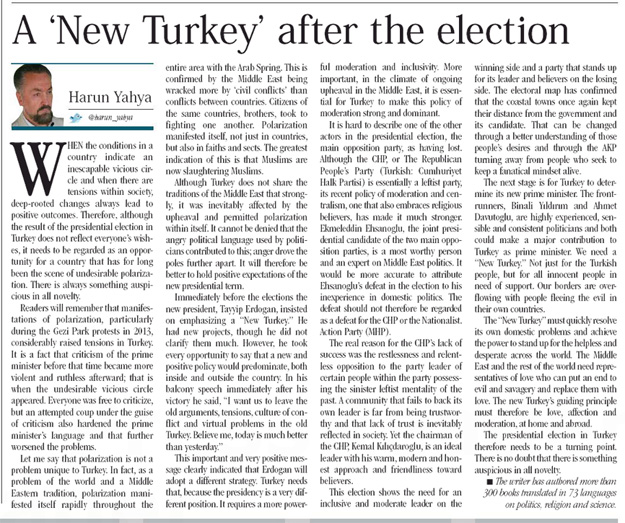
When the conditions in a country indicate an inescapable vicious circle and when there are tensions within society, deep-rooted changes always lead to positive outcomes. Therefore, although the result of the presidential election in Turkey does not reflect everyone’s wishes, it needs to be regarded as an opportunity for a country that has for long been the scene of undesirable polarization. There is always something auspicious in all novelty.
Readers will remember that manifestations of polarization, particularly during the Gezi Park protests in 2013, considerably raised tensions in Turkey. It is a fact that criticism of the prime minister before that time became more violent and ruthless afterward; that is when the undesirable vicious circle appeared. Everyone was free to criticize, but an attempted coup under the guise of criticism also hardened the prime minister’s language and that further worsened the problems.
Let me say that polarization is not a problem unique to Turkey. In fact, as a problem of the world and a Middle Eastern tradition, polarization manifested itself rapidly throughout the entire area with the Arab Spring. This is confirmed by the Middle East being wracked more by ‘civil conflicts’ than conflicts between countries. Citizens of the same countries, brothers, took to fighting one another. Polarization manifested itself, not just in countries, but also in faiths and sects. The greatest indication of this is that Muslims are now slaughtering Muslims.
Although Turkey does not share the traditions of the Middle East that strongly, it was inevitably affected by the upheaval and permitted polarization within itself. It cannot be denied that the angry political language used by politicians contributed to this; anger drove the poles further apart. It will therefore be better to hold positive expectations of the new presidential term.
Immediately before the elections the new president, Tayyip Erdogan, insisted on emphasizing a “New Turkey.” He had new projects, though he did not clarify them much. However, he took every opportunity to say that a new and positive policy would predominate, both inside and outside the country. In his balcony speech immediately after his victory he said, “I want us to leave the old arguments, tensions, culture of conflict and virtual problems in the old Turkey. Believe me, today is much better than yesterday.”
This important and very positive message clearly indicated that Erdogan will adopt a different strategy. Turkey needs that, because the presidency is a very different position. It requires a more powerful moderation and inclusivity. More important, in the climate of ongoing upheaval in the Middle East, it is essential for Turkey to make this policy of moderation strong and dominant.
It is hard to describe one of the other actors in the presidential election, the main opposition party, as having lost. Although the CHP, or The Republican People’s Party (Turkish: Cumhuriyet Halk Partisi) is essentially a leftist party, its recent policy of moderation and centralism, one that also embraces religious believers, has made it much stronger. Ekmeleddin Ehsanoglu, the joint presidential candidate of the two main opposition parties, is a most worthy person and an expert on Middle East politics. It would be more accurate to attribute Ehsanoglu’s defeat in the election to his inexperience in domestic politics. The defeat should not therefore be regarded as a defeat for the CHP or the Nationalist. Action Party (MHP).
The real reason for the CHP’s lack of success was the restlessness and relentless opposition to the party leader of certain people within the party possessing the sinister leftist mentality of the past. A community that fails to back its own leader is far from being trustworthy and that lack of trust is inevitably reflected in society. Yet the chairman of the CHP, Kemal Kılıçdaroglu, is an ideal leader with his warm, modern and honest approach and friendliness toward believers.
This election shows the need for an inclusive and moderate leader on the winning side and a party that stands up for its leader and believers on the losing side. The electoral map has confirmed that the coastal towns once again kept their distance from the government and its candidate. That can be changed through a better understanding of those people’s desires and through the AKP turning away from people who seek to keep a fanatical mindset alive.
The next stage is for Turkey to determine its new prime minister. The frontrunners, Binali Yıldırım and Ahmet Davutoglu, are highly experienced, sensible and consistent politicians and both could make a major contribution to Turkey as prime minister. We need a “New Turkey.” Not just for the Turkish people, but for all innocent people in need of support. Our borders are overflowing with people fleeing the evil in their own countries.
The “New Turkey” must quickly resolve its own domestic problems and achieve the power to stand up for the helpless and desperate across the world. The Middle East and the rest of the world need representatives of love who can put an end to evil and savagery and replace them with love. The new Turkey’s guiding principle must therefore be love, affection and moderation, at home and abroad.
The presidential election in Turkey therefore needs to be a turning point. There is no doubt that there is something auspicious in all novelty.
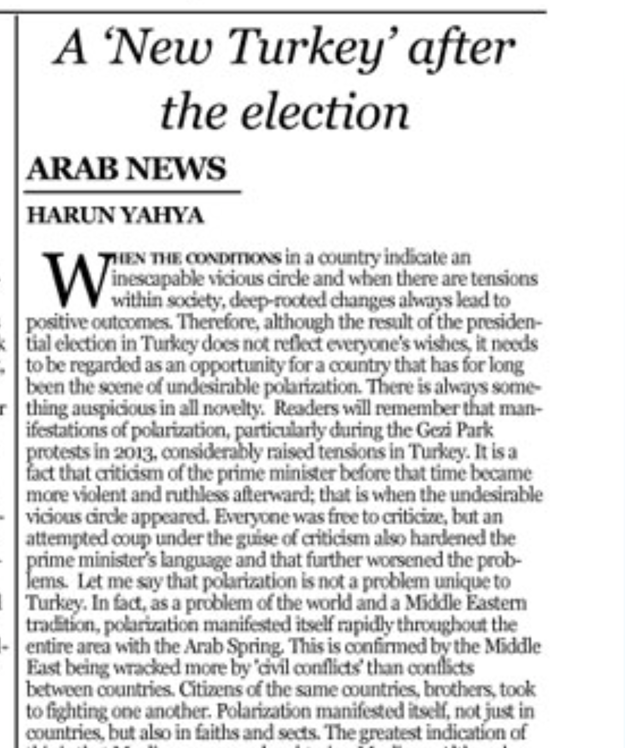
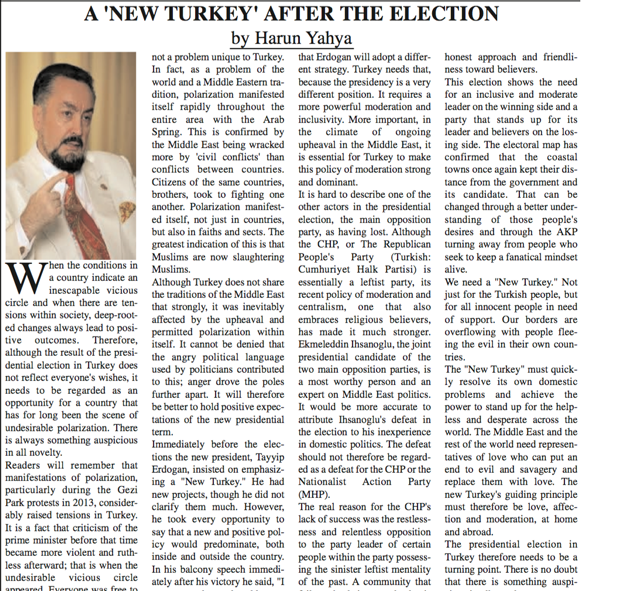
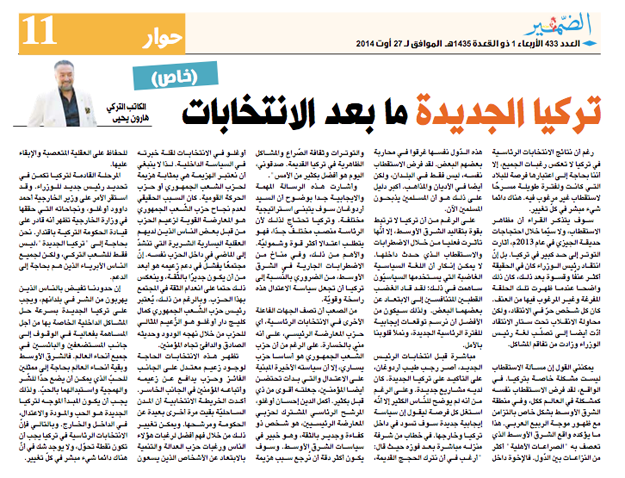
Adnan Oktar's piece on Arab News&National Herald Tribune&Urdu Times&Dhamir:


